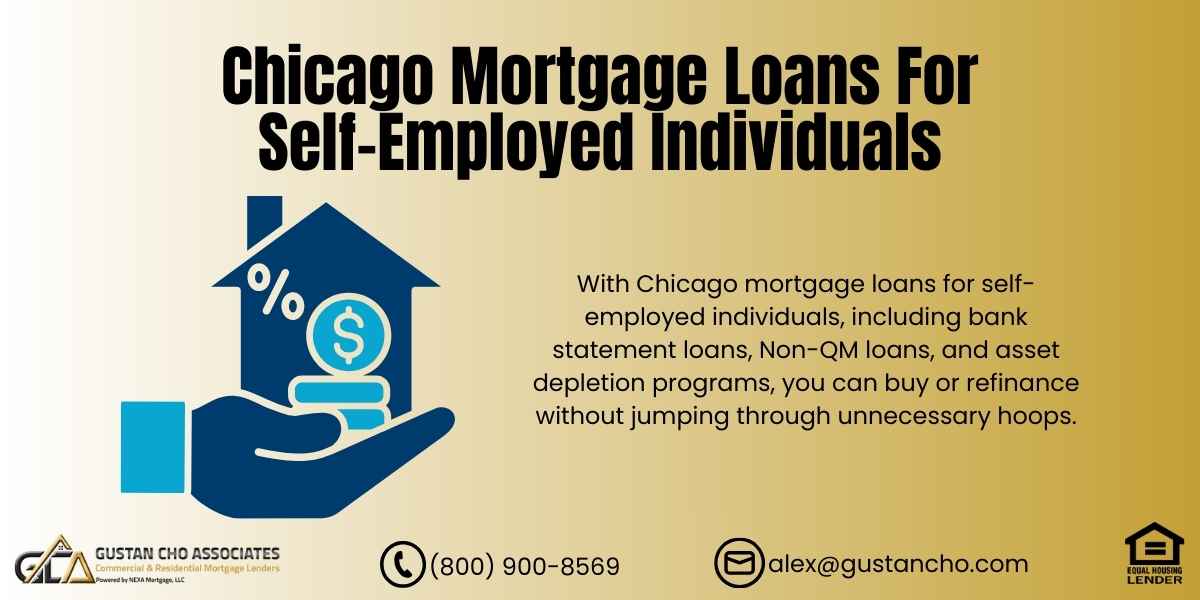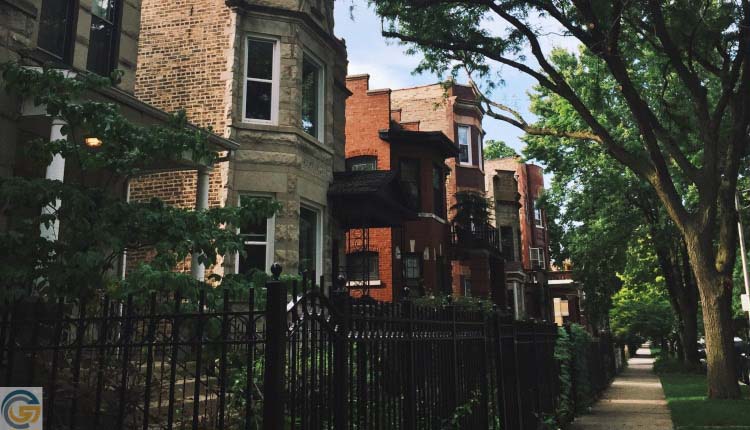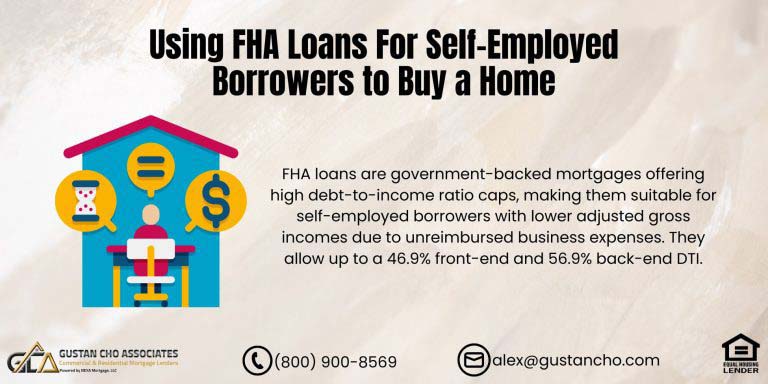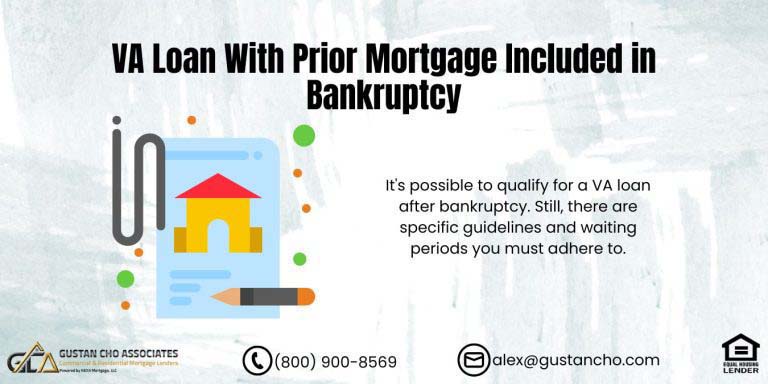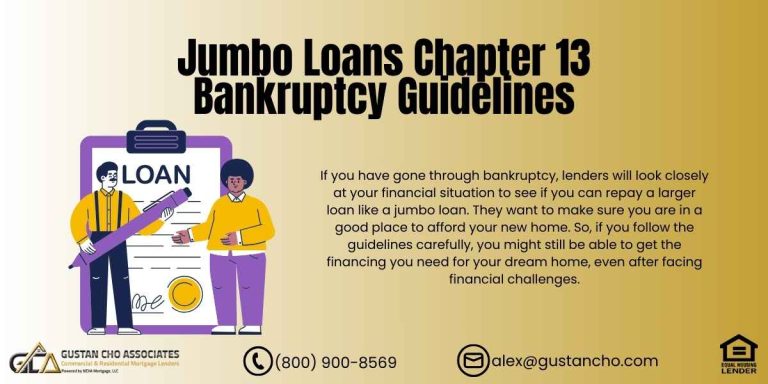Chicago Mortgage Loans for Self-Employed Individuals: 2025 Guide to Getting Approved
Being self-employed in the Chicago area can be super rewarding, but trying to qualify for a mortgage when you’re running your own business can seem really challenging.
Traditional lenders often want years of tax returns, piles of paperwork, and proof of “stable” W-2 income you may not have — especially if you write off business expenses to reduce your taxes.
At Gustan Cho Associates, we make it possible. With Chicago mortgage loans for self-employed individuals, including bank statement loans, Non-QM loans, and asset depletion programs, you can buy or refinance without jumping through unnecessary hoops.
In this guide, you’ll learn everything you need to know in 2025 — from how these loans work to the steps you can take today to get approved.
Why Self-Employed Borrowers in Chicago Have a Tougher Time Getting Mortgages
If you’re self-employed, your income picture looks different than a salaried employee’s. You might have strong cash flow but show lower taxable income because of business deductions.
Here’s the problem:
- Traditional mortgage guidelines use taxable income from your IRS returns.
- If your tax returns show a low number (even if you actually make more), you might not qualify for the loan amount you need.
That’s where our Chicago mortgage loans for self-employed individuals change the game. Instead of basing your approval on taxable income, we can use your bank statement deposits or liquid assets.
Self-Employed in Chicago? We’ve Got Your Mortgage Covered
From bank statement loans to alternative income verification, we make approvals simple.
2025 Lending Update for Self-Employed Homebuyers in Chicago
The lending landscape in 2025 is more flexible than it was just a few years ago. Some key updates:
- Bank Statement Loan Options Expanded: More lenders accept 12- or 24-month bank statements instead of tax returns.
- No Private Mortgage Insurance (PMI): Many Non-QM self-employed loans don’t require PMI, even with less than 20% down.
- Higher Loan Amounts: Non-QM loans in Chicago can go beyond conforming loan limits with no maximum cap.
- Asset Depletion Programs: Perfect for business owners with large savings or investments but irregular income.
- Competitive Rates: While Non-QM loans used to have much higher rates, the gap with conventional loans has narrowed in 2025.
How Chicago Mortgage Loans for Self-Employed Individuals Work
The main difference between a traditional mortgage and a self-employed-friendly loan is how income is verified.
Traditional Mortgage (W-2 Approach)
The traditional mortgage, often called the W-2 approach, requires the submission of two years’ worth of personal and business tax returns. This method averages income over the two years, while also considering deductions that can lower the qualifying income for the mortgage application.
Self-Employed Mortgage with Bank Statements
A self-employed mortgage that looks at your bank statements, figures out your income by checking out 12 or 24 months’ worth of bank deposits. Business deposits are averaged to determine the monthly qualifying income, allowing for a clearer reflection of financial health. Importantly, any withdrawals made do not negatively impact your qualification for the mortgage.
Example: If you deposit $15,000 a month into your business account, your qualifying monthly income is $15,000 — even if your tax return shows much less.
Types of Chicago Mortgage Loans for Self-Employed Borrowers
1. Bank Statement Loans in Chicago for Self-Employed
Bank statement loans in Chicago are designed for self-employed folks who have good cash flow but not much taxable income. Instead of needing tax returns, these loans determine your income by looking at your average bank deposits over the last 12 to 24 months. They’re flexible too, so you can use them for your main home, a vacation place, or even investment properties, with loan amounts going into the millions.
2. Non-QM Loans for Self-Employed Borrowers in Chicago
Non-QM (Non-Qualified Mortgage) loans are an excellent option for self-employed people in Chicago who need some leeway with their income documentation. These loans are perfect for folks with credit bumps in the road or different income situations. With no strict loan limits and flexible down payment options, Non-QM loans are a solid way to get financing without dealing with the traditional mortgage headaches.
3. Asset Depletion Loans in Chicago
We can calculate income using 4% of your liquid assets annually if you have large cash reserves or investments.
Example: $500,000 in assets = $20,000/year qualifying income.
4. Traditional Conventional and FHA Loans
Conventional or FHA loans may still be the most cost-effective option for self-employed borrowers with solid tax returns. FHA loans, in particular, have more flexible credit and down payment requirements.
Steps to Qualify for Chicago Mortgage Loans for Self-Employed Individuals in 2025
Getting approved is easier when you follow these steps:
Step 1: Check Your Credit Score
Before jumping in, it’s a good idea to check your credit score since a higher score can help you snag better rates and lower costs. For non-QM bank statement loans, we can work with credit scores that are around 620 and up.
Step 2: Organize Your Finances
It’s important to organize your finances effectively by keeping your business and personal accounts separate. This helps ensure clarity and accountability in your financial dealings. Additionally, maintaining clear bank statement records is essential—make sure to avoid large unexplained deposits, as these can raise questions and complicate your financial management. By staying organized, you can foster a healthier financial environment for your business.
Step 3: Choose the Right Loan Program
When selecting the appropriate loan program, it’s essential to consider your income as reflected in your tax returns. Tax returns are interpreted differently by each mortgage lender. Some lenders will add depreciation from Schedule C back to income. If your tax returns indicate a low income, options like a bank statement loan or an asset depletion loan may be the most suitable choice. However, if your tax returns demonstrate a strong financial standing, exploring conventional or FHA loans could potentially lead to cost savings.
Step 4: Work With a Lender Who Specializes in Self-Employed Loans
Not all lenders understand self-employed income. At Gustan Cho Associates, 80% of our clients are borrowers denied elsewhere.
How Bank Statement Loans Are Transforming Opportunities for Entrepreneurs in Chicago
Chicago entrepreneurs often face challenges with traditional lenders due to the common practice of writing off expenses to reduce tax burdens. While these deductions can be beneficial for tax purposes, they often result in a lower reported income, making it difficult for business owners to secure financing.
Chicago mortgage loans for self-employed individuals offer a solution by focusing on actual bank deposits rather than tax return figures. This approach allows borrowers to present a clearer picture of their financial health, ignoring the deductions that could hinder their ability to secure a loan.
These specialized loans are particularly advantageous for various professionals, including small business owners, independent contractors, freelancers, gig workers, and realtors who rely on commission-based incomes. By basing loan eligibility on real deposits, these loans empower entrepreneurs to qualify for larger amounts and better terms, ultimately enabling them to invest more strategically in their businesses and futures.
Down Payment and Rate Expectations for Self-Employed Loans in Chicago
When it comes to Chicago mortgage loans for self-employed individuals, the amount you need for a down payment really depends on your credit score, how big the loan is, and the kind of loan program you’re considering.
- Bank Statement Loans: As low as 10–15% down.
- Non-QM Jumbo Loans: 15–20% down.
- FHA Loans: As low as 3.5% down (with qualifying tax returns).
Rates in 2025:
- Bank statement loans generally run 0.5%–1% higher than traditional rates.
- Strong credit, larger down payments, and lower debt-to-income ratios can help reduce your rate.
Common Mistakes Self-Employed Borrowers Make (and How to Avoid Them)
- Mixing Personal and Business Finances – Keep them separate to make underwriting smoother.
- Large Unexplained Deposits – Lenders need to source funds; unexplained deposits can cause delays.
- Waiting Too Long to Prepare – Start gathering bank statements, asset documents, and credit reports months before applying.
- Choosing the Wrong Lender – Many big banks don’t offer bank statement loans, leading to unnecessary denials.
No W-2? No Problem
Chicago self-employed borrowers can qualify for a mortgage with flexible documentation.
Why Choose Gustan Cho Associates for Your Chicago Self-Employed Mortgage
We’re not your average lender. Here’s why self-employed borrowers choose us:
- No Lender Overlays: We follow agency and investor guidelines without adding extra rules.
- Licensed in 50 States, including D.C., Puerto Rico, and the U.S. Virgin Islands – Helping you even if you move or buy a second home.
- Multiple Self-Employed Loan Programs: From bank statement loans to asset depletion mortgages.
- Fast Closings: Many loans close in 30 days or less.
- 7 Days a Week Availability: Nights, weekends, and holidays included.
How to Apply for Chicago Mortgage Loans for Self-Employed Individuals
Getting started is simple:
- Call us at 800-900-8569 or text for a faster response.
- Email alex@gustancho.com for a custom pre-approval plan.
- Visit www.gustancho.com to learn more and start your application.
We’ll review your unique financial situation and recommend the best loan option — even if you’ve been turned down elsewhere.
Final Thoughts
Being self-employed shouldn’t mean being locked out of homeownership. With today’s loan programs and the right mortgage team, you can buy the home you want without sacrificing your financial strategy.
At Gustan Cho Associates, we specialize in helping Chicago entrepreneurs, freelancers, and business owners turn their homeownership goals into reality.
Borrowers who need a five-star national mortgage company licensed in 50 states with no overlays and who are experts on Chicago mortgage loans for self-employed individuals, please contact us at 800-900-8569, text us for a faster response, or email us at alex@gustancho.com.
Frequently Asked Questions About Chicago Mortgage Loans for Self–Employed Individuals:
Q: Can I Get Chicago Mortgage Loans for Self-Employed Individuals Without Showing Tax Returns?
A: Yes. With bank statement loans, we can use your 12–24 months of bank deposits instead of tax returns to calculate your income.
Q: What Credit Score do I Need for Chicago Mortgage Loans for Self-Employed Individuals?
A: For non-QM bank statement loans, we can often approve you with a credit score of around 620, though higher scores can get you better rates.
Q: How do Bank Statement Loans for Self-Employed Borrowers in Chicago Work?
A: We average monthly deposits from your business or personal bank account over 12–24 months. Withdrawals don’t lower your qualifying income.
Q: What’s the Down Payment for Chicago Mortgage Loans for Self-Employed Individuals?
A: If you’re looking at bank statement loans, you might need to put down around 10–15%. Conversely, FHA loans can have as little as 3.5% down if you can show your tax returns and qualify.
Q: Are Interest Rates Higher on Chicago Mortgage Loans for Self-Employed Individuals?
A: Bank statement loans may be 0.5%–1% higher than traditional rates, but you can lower your rate with strong credit and a larger down payment.
Q: Can I Use Chicago Mortgage Loans for Self-Employed Individuals to Buy an Investment Property?
A: Bank statements and non-QM loans can be used for your main home, vacation spots, and rental properties.
Q: Who are Chicago Mortgage Loans for Self-Employed Individuals Best Suited for?
A: They’re ideal for business owners, freelancers, independent contractors, gig workers, and commission-based earners with strong deposits but low taxable income.
Q: What is an Asset Depletion Loan for Self-Employed Borrowers in Chicago?
A: It’s a program that uses your savings or investments as income. We calculate qualifying income using 4% of your liquid assets.
Q: Why Choose Gustan Cho Associates for Chicago Mortgage Loans for Self-Employed Individuals?
A: We offer no lender overlays, multiple self-employed loan options, fast closings, and are licensed in all 50 states, including Illinois.
Q: How do I Apply for Chicago Mortgage Loans for Self-Employed Individuals?
A: Call us at 800-900-8569, text for a faster response, or email alex@gustancho.com. You can also start online at www.gustancho.com.
This article about “Chicago Mortgage Loans For Self-Employed Individuals” was updated on August 13th, 2025.
Fast Approvals for Chicago’s Self-Employed Homebuyers
We work with lenders who understand business owners and freelancers.


